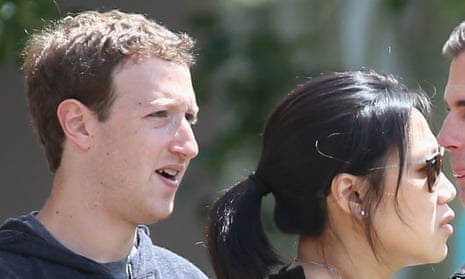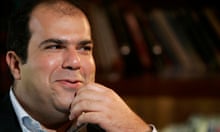It’s refreshing to see two prominent billionaires even paying lip service to upending plutocracy. And of course, considering the dire state of the global wealth gap, it would be counterproductive to do anything that could discourage future extreme giving from the wealthy.
Mark Zuckerberg and Priscilla Chan welcomed their newborn daughter Max into the world on 1 December with a joint open letter on Facebook promising her all sorts of things and announcing a philanthropic initiative involving 99% of their shares going to worthy causes.
A beautifully worded tribute to mark the couple’s entrance into parenthood, it is filled with references to global inequality and the mounting challenges baby Max now faces as a member of the generation that will bear the brunt of its parents’ environmental and financial mistakes.
The letter also introduced the Chan Zuckerberg Initiative, a charitable organization in the mould of the Bill and Melinda Gates Foundation, through which the couple plan to donate 99% of their Facebook shares over their lifetimes.
At current share prices the initiative is valued at $45bn – roughly $1bn a year – with a mission to “advance human potential and promote equality in areas such as health, education, scientific research, and energy”. More than 350,000 people – including the social media teams of Arnold Schwarzenegger, Arianna Huffington, Katie Couric, Scooter Braun and Shakira – have already liked the Facebook post or left their glowing praise in the comments.
CZI’s messaging will no doubt be coming soon to an on-air NPR donor roster near you (it’s already on track for a $3bn valuation by 2018, provided Facebook Inc continues to thrive), and experts are predicting the gesture will inspire more one percenters to finally make good on their idealistic grandstanding and donate their own fortunes in the name of bettering humankind’s collective chances for survival.
Still, the announcement should prompt (or perhaps revive) a conversation about philanthropy as a viable solution: can it truly, effectively produce social change? If so, can it produce it for all? And most importantly, can it outweigh the impact its benefactors have, by definition, already made on global society, simply by amassing huge amounts of wealth, information and power through an inherently long-biased economic system?
Philanthropy can produce social change, to an extent. The impact is often difficult to quantify, but philanthropic donations can obviously make a huge difference in whatever causes they aim to support, from the passing of the Affordable Care Act (or any election funded by a Super Pac, for that matter) to the private funding of cancer and other medical research.
Studies have shown that billionaire altruists like Zuckerberg are increasingly directing the course of American science, for example, and can supercharge research that has otherwise been bogged down in public sector and governmental bureaucracy – thus saving thousands if not millions of lives.
But it also means that the rich are still effectively buying the future they’d like to see, no matter how selfless their intentions may be. International philanthropy and the western world’s desire to eradicate poverty and disease can’t ever truly rid themselves of their imperialist roots; as many critics have pointed out, the white savior industrial complex has never been more pervasive in global culture. When you have an extra $45bn lying around, nothing you do with that money will come without strings, whether you craft those strings or not.
Simply by creating and overseeing the world’s largest social network and one of the most influential corporations on Earth – by gathering and selling untold amounts of data under the protection of inscrutable legal jargon, by implementing shaky harassment and reporting policies that permit certain kinds of abuse, by employing 68% men and fewer than 50 black people in a company of more than 10,000 employees (to say nothing of the unholy spectre of gentrification) – Mark Zuckerberg himself continues to reproduce the inequality he and his wife are taking aim at with their pledge.
As the critic Teju Cole puts it, power like theirs “supports brutal policies in the morning, founds charities in the afternoon, and receives awards in the evening”. And until that cycle changes, philanthropic initiatives can only go so far.
Much like the ongoing social justice conversation about conditional empathy being better than no empathy at all, if it took Max Chan Zuckerberg’s birth to give her parents the courage and determination to destroy their own ivory tower for the needs of the many, we should all be praying that she’ll get a few more siblings in the coming years.








